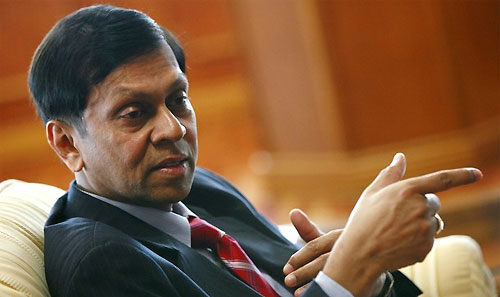|
Cabraal says GSP Plus, IMF would not be problems
Mar 23, 2010 | |
 Speaking to journalists last week, Cabraal said talks between Sri Lanka and the European Commission with regards to continuing with GSP Plus trade concessions were progressing well. "We are optimistic it (GSP Plus) would materialise but we have ensured that Sri Lanka can face up to a crisis (in the event the trade concessions are withdrawn. We must recognise the fact that the economy must move forward notwithstanding GSP Plus," Cabraal said in answer to a question raised about the progress made in talks by a special delegation that visited the EU recently. "Discussions have so far been positive," Cabraal said. The European Commission has been asking the government to assist it to carry out investigations into the country’s human rights record, a request the government has always denied on the grounds that infringed upon the country’s sovereignty. Economists argue that GSP Plus could be of great benefit to the post-war economy as it would help maintain existing jobs and help create new jobs as Sri Lanka strives to diversify its export basket to make use of the 7,000 tariff-free lines under GSP Plus. With the world economy slowly emerging from a global crisis, although some economists argue the recovery is still not in sight, GSP Plus would help Sri Lanka retain its export markets in the EU, particularly for ready made garments already under siege by low-cost competitors from Bangladesh, Vietnam and China. Sri Lanka still has time to reach a compromise with the European Commission, but in the event GSP Plus is lost, the President said temporary relief would be given to exporters to the EU. However, exporters, while recognising the need to uphold the countrysovereignty, are sceptical that the government could ‘afford’ a meaningful relief package. On the fiscal side, the government has overshot the fiscal deficit target for 2009 it set for itself which the IMF endorsed when it approved a US$ 2.6 billion standby facility last year. The 7 percent of GDP deficit target expanded to 9.7 percent and the IMF is delaying the payment of the third tranche until they are satisfied with the government’s commitment and policy direction to reign in high budget deficits. This could only be seen when the next budget is presented to parliament and the IMF is clear that only a clear policy directive to curb excessive spending in the next budget would ensure the continuance of the standby facility. It believes spending is important to stimulate growth and build infrastructure and bring the once war torn regions to normalcy but ‘other spending’ is an area of concern. The Central Bank’s Annual Report for 2008, and the flagship report of the Institute of Policy Studies, Sri Lanka: State of the Economy 2009, both highlight the need for the government to reign in high expenditure as priority spending could come under stress. Cabraal said Sri Lanka met all but one of the targets during the last IMF review concluded last month. "The IMF review mission would be back after the elections and we believe there would not be a problem," Cabraal said. Economists argue that Sri Lanka no longer needs the IMF because the original problem, a balance of payments crisis, which made the standby facility important then does not exist now with official reserves now in the range of US$ 6 billion. However, they argue that the continuance of the IMF programme is important because it would give foreign investors confidence that Sri Lanka is keen to address its fiscal imbalances in a bid to further long term sustainable development. "Leave out foreign investors, although they are necessary for Sri Lanka’s development with financial resources being scarce, but the people of the country deserve more than they have been getting all these years. Terrorism is over but now its time to address the other major problem that of structural fiscal imbalances and indiscipline," an economist said not wanting to be named. Courtesy: GDI
|
|
|
| |